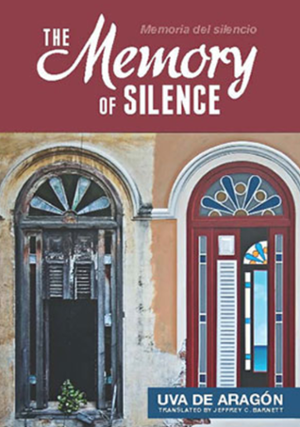Support Cubanabooks
To support Cubanabooks, visit our page at North Valley Community Foundation.
Author: Uva de Aragón
Translator(s): Jeffrey C. Barnett
ISBN: 978-0-9827860-4-8
How to Purchase
Our books are available for individual purchase (print and e-books) at Amazon.com(opens in new window) and most other online retailers.
For library, bookstore, or other bulk orders please contact Small Press Distribution(opens in new window) or write to the editor-in-chief at scooper@csuchico.edu.


2nd Place Best Historical Novel — Spanish Or Bilingual
International Latino Book Awards 2016
The Memory of Silence is Uva de Aragón's first major novel, but it is by no means her first major literary contribution. Since her first publication in 1972, she has penned numerous works in the genres of short story, poetry, and critical essay. Her works have been published by equally diverse presses in Spain, the United States, and Cuba. Likewise, her translated fiction has appeared in well-known anthologies, including "Not the Truth, Not A Lie" in Ann Louise Bardach's Cuba and "Round Trip" in Peter Bush's The Voice of the Turtle, among others. Professor, poet, journalist, critic, and artist, de Aragón has spoken on Cuban themes through a wide range of media, but it is in The Memory of Silence where she has found her most resonating voice.
The Memory of Silence explores the lives of two sisters separated at the outset of the Cuban Revolution. In 1959, at the age of 18, the twin sisters Lauri and Menchu share a common past, but their lives abruptly take on seemingly irreconcilable differences as Lauri leaves with her groom for Miami and Menchu remains in Havana. For the next forty years, both lead distinct lives in terms of their daily concrete realities yet, often unknowingly, they share common milestones, attitudes, values, and intimate secrets. The reader is witness to the challenges of their lives through the memoirs that both sisters have kept. The text, then, becomes a series of interpolated chronicles, as each alternating chapter recounts one sister's life and then the other until finally in the present, now reunited, the sisters must confront the pain of the past and as well as the promise of the future.
De Aragón's novel stands apart in many respects. First and foremost, the underlying theme of reconciliation is a refreshing message and, most importantly, a timely one. As a sophistical story that intertwines two simultaneous histories, Memory serves as a cultural and historical window into a formative era that has defined in many ways both the United States and Cuba. For the reader of English who seeks to understand more fully how we arrived at this moment, The Memory of Silence offers a unique and convincing voice about a life left behind and life forged ahead.
While it is true that the novel most forcibly speaks to those interested exclusively in Cuban matters, its English translation, in my opinion, will transcend that scope and also be of interest to students of Latin American and Caribbean Studies, Women and Gender Studies, literature in translation, and Diaspora studies among others.
—Jeffrey C. Barnett